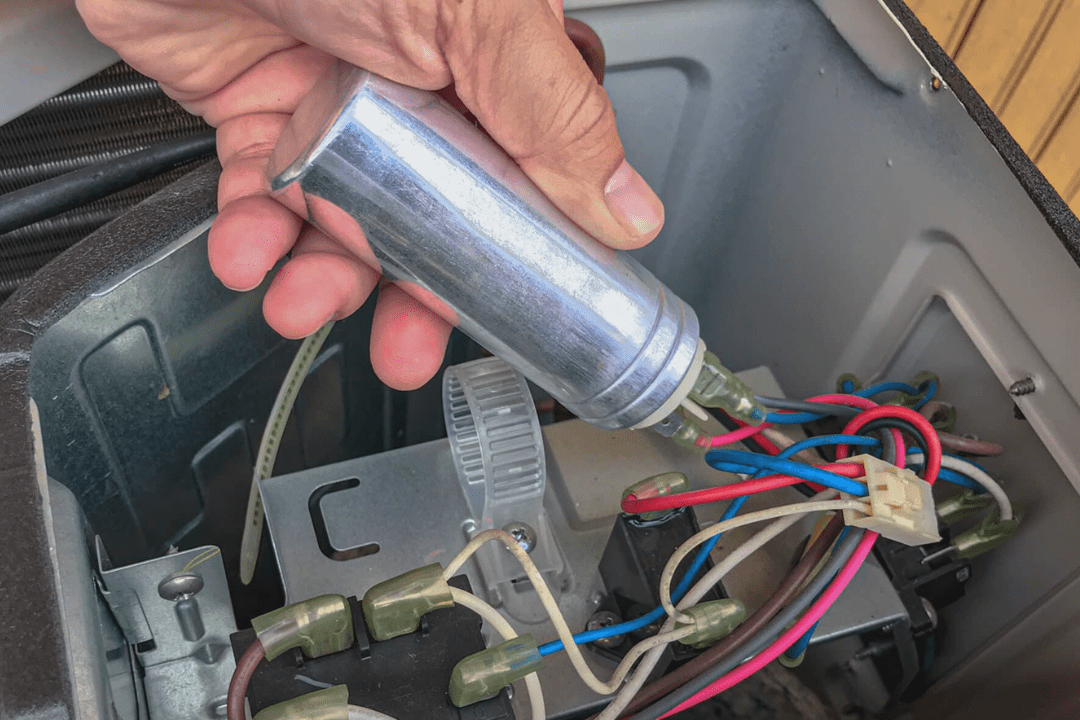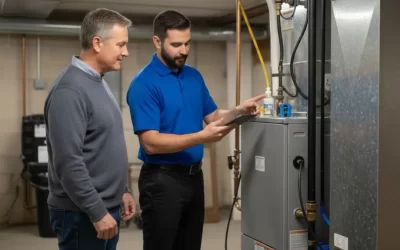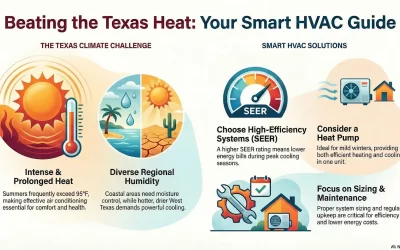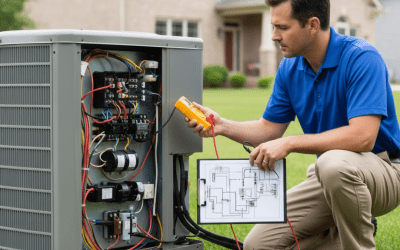When your air conditioner struggles to start, blows warm air, or shuts down unexpectedly, the problem often comes down to a small but critical component, the AC capacitor. This device stores and releases electrical energy, giving the compressor and fan motors the boost they need to run efficiently. Over time, heat exposure, electrical surges, and natural wear cause capacitors to lose strength or fail altogether. When that happens, your AC can’t perform at its best, and in severe cases, it may stop working completely.
Hence, recognizing the role of the capacitor and knowing when an AC capacitor replacement is necessary can prevent breakdowns, extend your system’s life, and help you avoid costly emergency repairs. In this blog, we’ll break down these key signs of capacitor failure, why they happen, and why timely replacement is so important. Let’s get straight in!
What Does an AC Capacitor Do?
Acts Like a Battery for Your AC
An AC capacitor’s main job is to store electrical energy and release it when the system calls for it. The moment you turn on the unit, it delivers a quick surge of power strong enough to get heavy-duty components like the compressor and fan motors moving.
Keeps Motors Running Smoothly
Starting is just half the job. After your system kicks on, the capacitor continues to send out a steady electrical current so the motors don’t struggle or overheat. Without this regulated flow of energy, your AC would run unevenly, leading to poor cooling and higher energy use.
Reduces Stress on Your AC System
By giving motors the exact energy they need, capacitors prevent them from drawing too much current directly from your home’s electrical supply. This lowers the strain on both your AC unit and your electrical panel, helping extend the system’s lifespan.
Signs Your AC Capacitor is Failing
Ac Won’t Turn on at All
If your unit doesn’t start when you set the thermostat, a dead capacitor may be to blame. Without that initial electrical jolt, the compressor and motors can’t power up.
Frequent “Hard Starting”
When the AC struggles to start or makes a clicking sound before running, the capacitor may not be delivering enough power to kickstart the motor.
Weak or Warm Airflow
If the blower motor isn’t getting a steady current, it may run slower than normal. This results in poor airflow from vents and lukewarm air instead of strong cooling.
AC Shuts Off Randomly
A failing run capacitor can’t hold a charge long enough, causing the system to stop mid-cycle or short cycle (turning on and off repeatedly).
Unusual Humming or Clicking Noises
When a capacitor weakens, the motors may try to start but can’t reach full power. This often creates a humming or clicking sound from the outdoor unit.
Higher Energy Bills
Weak capacitors force motors to work harder and draw more electricity, which can show up as unexplained spikes in your utility costs.
Physical Signs on the Capacitor Itself
If you inspect the capacitor and notice bulging, leaking oil, or corroded terminals, it’s a clear indicator that the component is failing and should be replaced immediately.
Tripped Circuit Breaker
A capacitor that can’t regulate electrical flow properly may cause motors to pull excess current, overloading the circuit and tripping breakers.
Recognizing these symptoms early can help you plan for AC capacitor replacement cost before more expensive repairs become necessary.
Experiencing hard starts, warm air, or sudden shutdowns? Let us replace your AC capacitor and restore your comfort fast.
How a Faulty Capacitor Can Damage Your System?
Compressor Burnout
The AC Compressor requires a high jolt of energy from the capacitor to start. When the capacitor is weak, the compressor struggles to turn on, drawing excess current and overheating during each attempt. Over time, this repeated strain can cause the windings inside the compressor motor to burn out. Since compressors are sealed units and one of the most expensive AC components (often $1,500–$3,000 to replace), capacitor failure is one of the most common indirect causes of compressor death. Homeowners often realize this only after searching for air conditioning repairs near them, when it’s too late to save the compressor. Timely capacitor replacement can prevent that costly outcome.
Motor Failure
The blower motor (inside) and fan motor (outside) rely on a run capacitor for a steady supply of electricity. If that supply is unstable, motors run at lower torque, overheat, and may stall mid-operation. This not only weakens performance but can also lead to insulation breakdown in the motor windings, causing them to short. Replacing motors can cost several hundred dollars, making a simple AC capacitor replacement much more cost-effective.
Electrical Component Damage
A faulty capacitor forces the system to draw higher amperage than normal, which overstresses other electrical parts like relays, contactors, and even the control board. Contactors may weld shut, circuit boards may burn, and wiring insulation can degrade. Once electrical damage spreads beyond the capacitor, repair costs multiply quickly, since multiple components may need replacing.
Shortened System Lifespan
Every hard start, short cycle, or overheating episode caused by a weak capacitor accelerates wear and tear. Compressors, motors, and electrical parts all degrade faster, shaving years off the AC’s normal 12–15 year lifespan. In extreme cases, homeowners who neglect capacitor replacement may find themselves replacing the entire AC system several years earlier than expected.
Increased Risk of Circuit Overloads
When capacitors can’t regulate current properly, motors draw more power directly from the electrical panel. This can cause frequent tripped breakers, blown fuses, and voltage drops throughout the system. Over time, repeated overloads degrade both the AC unit and the home’s electrical infrastructure, increasing the risk of wiring issues or even fire hazards if left unchecked.
A small, inexpensive part can trigger thousands in repair bills, which is why timely service and learning how much does it cost to replace an AC capacitor are so critical for homeowners.
AC Capacitor Replacement Costs and What to Expect
Typical Replacement Cost Range
On average, AC capacitor replacement costs run between $120 to $400, including both the part and professional labor. The wide range depends on unit type, capacitor size, and service call fees.
Cost of the Capacitor Itself
A standalone AC capacitor usually costs $10 to $60 at retail. However, HVAC companies may charge more to replace AC capacitor part due to sourcing, warranty, and markup.
Type of Capacitor Matters
- Run capacitors (common in most systems) usually cost less.
- Start capacitors or dual capacitors (which support multiple components) tend to cost more, sometimes up to $100+ for the part alone.
Labor Charges
Most of the expense comes from professional labor. HVAC technicians typically charge $75 to $200 per hour, and since AC capacitor replacement is a quick job (30–60 minutes), labor often adds $100–$200 to the bill.
Professional Vs. DIY: What to Expect
Now, post this, the first question that strikes you is, Can I replace the AC capacitor myself? Technically, yes, you can purchase a capacitor for $10–$60. But capacitors hold dangerous charges even when the power is off, and mishandling them can result in injury or system damage. That’s why most experts strongly recommend professional replacement. Choosing to have professional air conditioning repairs near you ensures safety, proper installation, and often includes a warranty.
You can further refer to our detailed guide to AC components and cooling efficiency, which shows how one small repair prevents major expenses while boosting overall system performance, to understand the need for emergency repairs to avoid costly payments.
Conclusion
A faulty capacitor may seem minor, but ignoring it can set off a chain reaction of costly damage. The good news is that AC capacitor replacement is quick, affordable, and can dramatically extend the life of your AC. That’s why professional service matters. At Classic Services Air Conditioning & Heating, our certified technicians don’t just swap parts; they test your system thoroughly to catch hidden issues before they turn into expensive repairs. With expert care and trusted service, you’ll enjoy reliable comfort, lower energy bills, and peace of mind knowing your AC is protected year-round.






